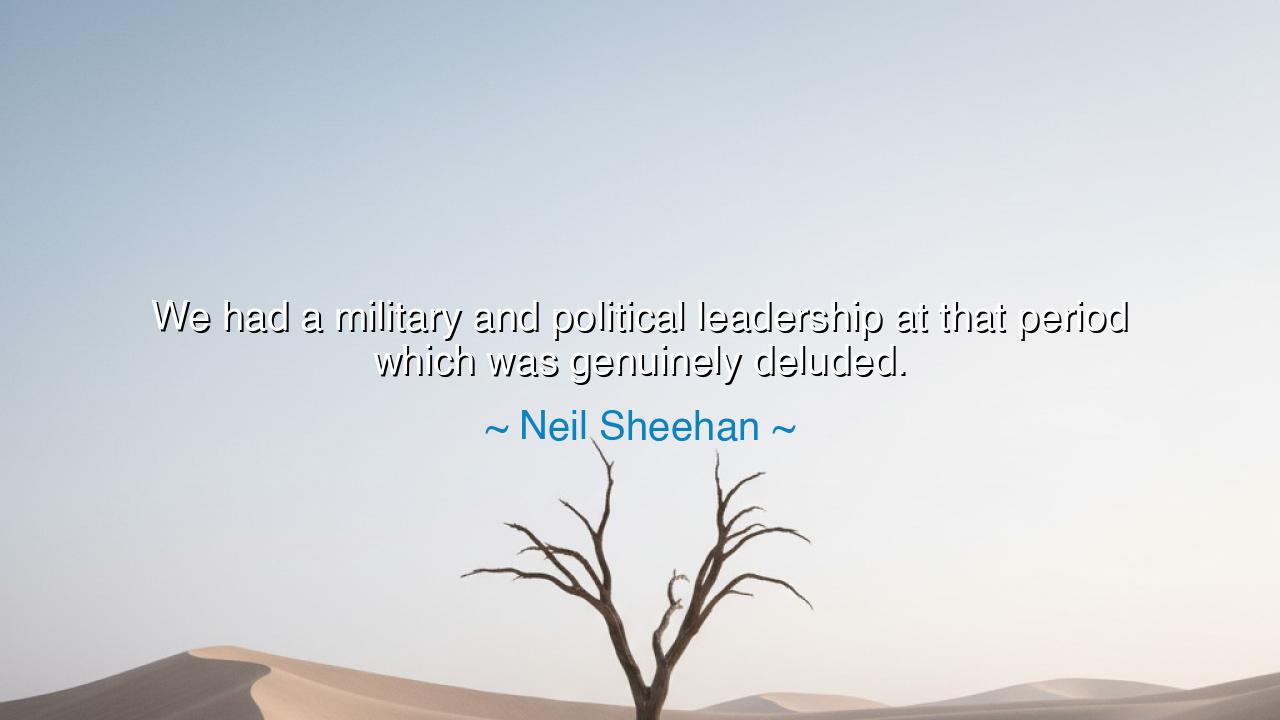
We had a military and political leadership at that period which






“We had a military and political leadership at that period which was genuinely deluded.” — Neil Sheehan
In these grave and haunting words, Neil Sheehan, the war correspondent and historian, speaks not only of a single time, but of a timeless tragedy — the blindness of power. His words, drawn from his reflections on the Vietnam War, are not merely an indictment of individuals, but a lament for a system that mistook pride for vision and illusion for truth. When Sheehan says that the leaders were “genuinely deluded,” he does not speak of deceit or corruption alone; he speaks of something deeper — the self-deception that can overtake even the intelligent and the honorable when they are consumed by ideology, ambition, or fear. It is a warning carved from the bones of history: that when those in command lose the ability to question themselves, nations are led into ruin.
The origin of this quote lies in Sheehan’s monumental work, A Bright Shining Lie, a book that stripped bare the myths of the Vietnam conflict. As a journalist who witnessed the war firsthand, he saw the chasm between reality and rhetoric — the endless optimism of generals and politicians contrasted with the despair and bloodshed of soldiers in the field. The “delusion” he speaks of was not madness, but conviction — the belief, repeated endlessly in offices and press briefings, that victory was inevitable, that moral righteousness was theirs, and that those who doubted were weak or disloyal. Sheehan understood that such delusion, when cloaked in authority, becomes more dangerous than lies — for the liar at least knows he deceives, but the deluded man believes he serves the truth.
The ancients, too, warned of this peril. Thucydides, chronicler of the Peloponnesian War, described how Athens — the beacon of Greek civilization — was led into folly by its own arrogance. Its leaders, convinced of their destiny and blinded by pride, waged wars they could not win, and their empire collapsed in shame. The philosopher Plato called this the “tyranny of opinion,” when men prefer illusion to wisdom, and rhetoric to reason. In every age, from ancient Athens to modern America, the same shadow falls: those who command armies and nations may become prisoners of their own certainty.
To understand Sheehan’s sorrow, one must remember the faces behind his words. In the jungles of Vietnam, young soldiers fought and died for ideals their leaders no longer understood. They were told they fought for freedom, but found themselves trapped in a war of attrition and confusion. General William Westmoreland, with unwavering confidence, assured the nation that success was near, even as the enemy grew stronger. Politicians repeated the same mantra, not out of malice, but out of fear — fear of admitting error, fear of losing face before the world. Thus, the delusion deepened. It was not the deceit of tyrants, but the self-deception of patriots — the tragedy of men who believed too fiercely in their own righteousness to see the truth before them.
History is filled with such delusions. Napoleon, who once liberated Europe from monarchy, became the very despot he had fought against, convinced he could not fail. Adolf Hitler, surrounded by loyalists who dared not contradict him, drove his nation into annihilation believing himself chosen by destiny. Neil Sheehan’s words, though born of Vietnam, speak across centuries: when leaders mistake their convictions for truth, when they surround themselves with flatterers instead of truth-tellers, they become deluded, and their delusion consumes not only themselves but the people they lead.
Yet within this grim reflection lies a message of hope and responsibility. Sheehan’s insight is not meant to foster despair but to awaken vigilance — the eternal duty of both leader and citizen. The cure for delusion is not cynicism, but humility. Leaders must remember that power does not grant infallibility; it demands wisdom, restraint, and the courage to listen to dissent. The governed, too, must resist the comfort of blind faith and demand truth over reassurance. A people that worships authority without question becomes complicit in its own deception.
Let this be the lesson for all ages: delusion is the silent destroyer of nations. It begins not in lies, but in certainty; not in weakness, but in pride. Guard your leaders, and yourselves, against the intoxication of unchallenged belief. Seek truth even when it wounds, for truth, though painful, is the only remedy for folly. As Sheehan teaches through his lament, the greatest danger to any nation is not the enemy outside, but the blindness within — the moment when its leaders can no longer see what they have become.
So, O seeker of wisdom, remember this: to lead is to doubt wisely. Question your victories as much as your failures. Listen not only to praise, but to warning. For leadership without reflection becomes delusion, and delusion, left unchallenged, becomes destiny. And as Neil Sheehan’s words echo through time, they remind us that the cost of truth ignored is always paid in blood.






AAdministratorAdministrator
Welcome, honored guests. Please leave a comment, we will respond soon